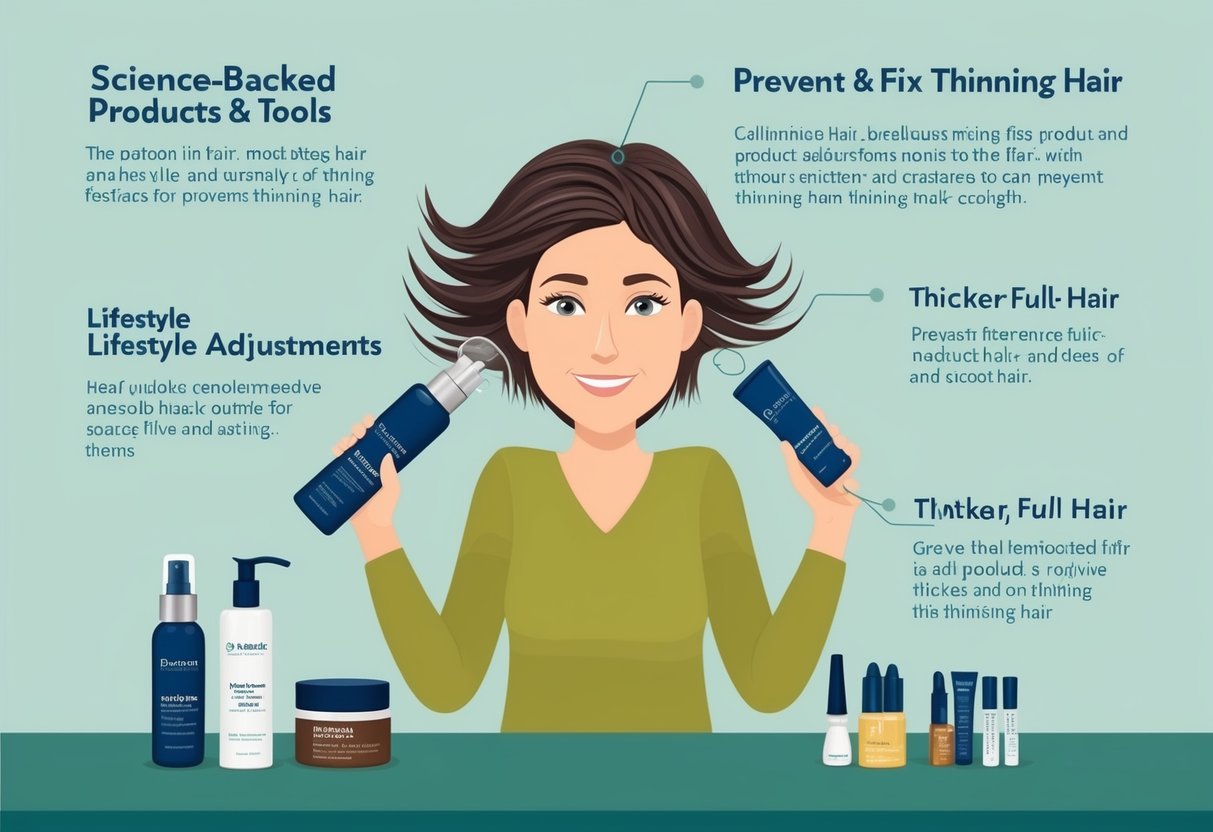How to Fix Thinning Hair: Science-Backed Solutions for Thicker, Fuller Hair
Managing Dihydrotestosterone Levels
Controlling the amount of dihydrotestosterone (DHT) in the scalp is vital in managing androgenetic alopecia. DHT binds to hair follicles and causes them to miniaturize, leading to thinner hair and eventual hair loss.
Finasteride and similar medications classified as DHT blockers directly reduce DHT production and limit its activity in hair follicles. For individuals with a family history of male or female pattern hair loss, targeting DHT can significantly slow progression.
In addition to oral medications, topical treatments and certain shampoos also claim to block DHT, though their effectiveness is less established than prescription options. Medical consultation ensures the most appropriate approach, with periodic assessments to evaluate efficacy and safety.
Essential Nutrients and Supplements for Hair Health
Adequate nutrition is crucial for maintaining strong, thick hair. Key nutrients such as iron, biotin, collagen, and amino acids, along with targeted supplements, directly affect hair follicle health, growth, and structure.
Iron and Hair Growth
Iron plays a vital role in hair growth and density. It supports the production of hemoglobin, which carries oxygen to hair follicles and helps maintain their function.
Low iron stores can lead to increased hair thinning and even hair loss. Women, especially those with heavy periods or following plant-based diets, are at greater risk of iron deficiency.
Including iron-rich foods such as lean red meat, legumes, and spinach, or considering iron supplements when appropriate, can help restore healthy levels. Iron is one of the essential trace minerals for healthy hair growth.
Biotin, Keratin, and Collagen
Biotin is a B vitamin that plays a key role in the production of keratin, a structural protein that forms the foundation of each hair strand. Individuals with biotin deficiency may experience brittle, thinning hair or breakage.
Keratin supplements may help boost hair strength, while collagen provides the amino acids needed to produce new hair proteins. Consuming a diet rich in eggs, fish, seeds, and nuts supports these processes.
Many popular hair growth supplements contain a blend of biotin, keratin, and collagen for comprehensive support. You can learn more about effective hair growth vitamins and their benefits.
Role of Amino Acids in Hair Structure
Hair is primarily made of protein, mainly keratin, which itself is made from amino acids. Essential amino acids such as cysteine, methionine, lysine, and arginine are needed to form strong hair fibers.
A deficiency in dietary protein or these amino acids can lead to weaker, thinning hair. Incorporating high-quality protein sources, such as poultry, dairy, fish, tofu, and beans, encourages new hair cell growth and repairs damaged strands.
Some supplements also combine amino acids with other nutrients to further enhance hair recovery and structure, improving overall hair fullness and quality. For more on supporting hair strength, see effective dietary and supplement recommendations for hair health.
Lifestyle Adjustments to Prevent Hair Thinning

Daily choices directly affect hair thickness and strength. Paying specific attention to stress and adopting a nutrient-rich diet can help support healthy hair growth and minimize hair thinning.
Reducing Stress for Healthier Hair
Chronic stress is a significant factor in hair thinning and conditions such as telogen effluvium. High cortisol levels can disrupt the hair growth cycle, pushing hair follicles into a resting phase and leading to increased shedding.
Incorporating relaxation techniques like meditation, yoga, or regular physical activity can help manage stress. Taking breaks throughout the day to breathe deeply or go for short walks may lower stress hormones.
Consistent sleep schedules support the body’s ability to repair and grow hair overnight. Adults should aim for 7-9 hours of quality sleep each night.
It’s also helpful to set boundaries at work or home to avoid prolonged periods of high stress, which can trigger further hair loss. Support from friends, family, or professional counselors can contribute to effective stress management strategies and healthier hair outcomes.
Nutrition and Healthy Habits
Hair relies on a steady supply of nutrients such as iron, zinc, folic acid, biotin, and vitamin E. Deficiencies in these vitamins and minerals are closely associated with increased hair shedding and weak hair growth.
For example, daily supplements with the right mix of iron, folic acid, and zinc can help promote thicker, healthier hair. A balanced diet should include lean proteins, nuts, leafy greens, and colorful vegetables.
Protein is especially important for the structure of each hair strand. Staying hydrated and avoiding crash diets can preserve hair density.
Regular exercise increases circulation to the scalp, encouraging nutrient delivery to the follicles. For those who want to go further, some studies support using pumpkin seed oil as part of a hair-healthy routine due to its potential to help with thickness in some hair types.



